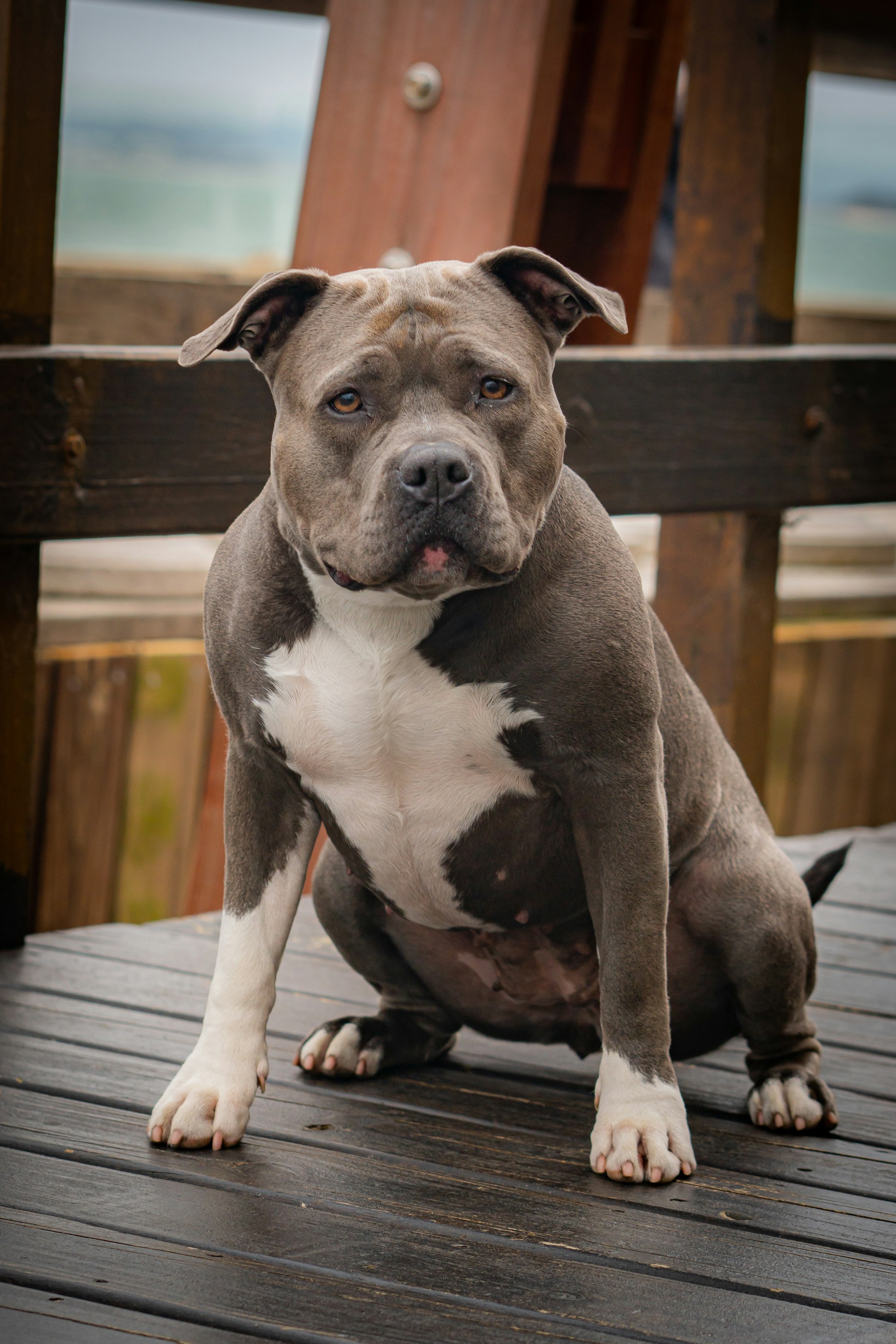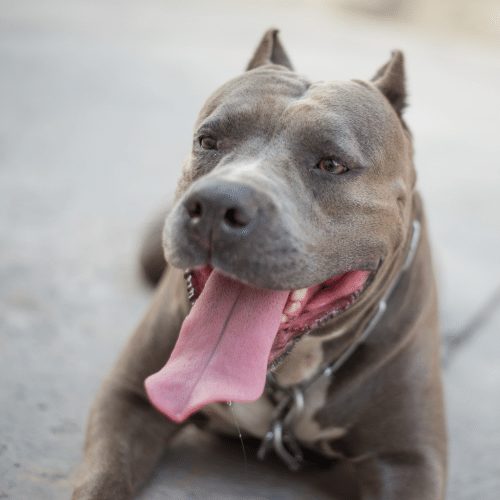Pit bulls live on average 12-14 years. Factors like genetics, diet, and exercise can influence their lifespan.
Pit bulls, a popular breed known for loyalty and affection, typically live between 12-14 years. However, factors such as genetics, diet, and exercise can significantly impact their longevity. To ensure your pit bull enjoys a full and healthy life, providing proper care and regular veterinary check-ups is essential.
By understanding the factors that influence their lifespan, you can create a loving and supportive environment for your furry companion. Let’s explore the key considerations that play a role in determining how long pit bulls live and how you can optimize their well-being for years to come.

Credit: www.youtube.com
Introduction To Pit Bull Lifespan
Pit bulls, known for their loyalty and strength, are beloved members of many families. Understanding the lifespan of these dogs is essential for pet owners to provide the best care and support. In this article, we’ll explore the factors that influence the longevity of pit bulls, setting realistic expectations for their lifespan and delving into the breed’s background to gain insight into their overall health and wellness.
Setting Expectations
It’s important to have a clear understanding of what to expect in terms of the lifespan of pit bulls. By considering various factors such as genetics, diet, exercise, and healthcare, owners can provide the best environment for their pets to thrive and live a long, happy life.
Breed Background
Pit bulls, also known as American Pit Bull Terriers, are a strong and athletic breed originally developed for bull-baiting and as farm dogs. Despite their historical background, modern pit bulls are cherished for their affectionate nature and make wonderful companions when provided with proper care and training.
Genetics And Longevity
Pit Bulls’ lifespan is influenced by genetics and lifestyle factors, typically living 12-16 years. Regular exercise and a balanced diet can contribute to their longevity. Proper care and regular vet check-ups are essential for ensuring a Pit Bull’s health and well-being.
Inherited Health Conditions
One of the key factors that influence the lifespan of pit bulls is their genetic makeup. Pit bulls, like any other dog breed, can be prone to certain inherited health conditions. These conditions can have a significant impact on their longevity. By understanding these potential health issues, pit bull owners can take proactive measures to ensure their pets live a long and healthy life.
The Role Of Breed Purity
Breed purity also plays a crucial role in determining the lifespan of pit bulls. When pit bulls are bred with other breeds or mixed breeds, their genetic composition becomes more diverse, which can introduce a wider range of potential health issues. On the other hand, purebred pit bulls are more likely to have a predictable genetic makeup, which can make it easier to anticipate and address any potential health concerns. When it comes to inherited health conditions in pit bulls, certain disorders are more common than others.
Here are some of the most prevalent health conditions that can affect the lifespan of pit bulls: – Hip Dysplasia: This condition occurs when the hip joint doesn’t develop properly, leading to joint instability and pain. Regular exercise, a balanced diet, and weight management can help alleviate symptoms and improve the overall quality of life for pit bulls with hip dysplasia. – Allergies: Pit bulls may be susceptible to various allergies, including food allergies, environmental allergies, and skin allergies. Identifying and avoiding allergens, along with proper veterinary care, can help manage these allergies and prevent complications that could shorten their lifespan. – Heart Disease: Certain types of heart disease, such as dilated cardiomyopathy, can affect pit bulls.
Regular check-ups with a veterinarian, a heart-healthy diet, and appropriate exercise can help detect and manage heart conditions, ensuring a longer and healthier life for pit bulls. – Cancer: Like many other dog breeds, pit bulls can develop cancer. Regular veterinary exams, early detection, and appropriate treatment options, such as surgery, chemotherapy, or radiation therapy, can increase the chances of successful management and potentially prolong their lifespan. It’s important to note that while genetics and breed purity can influence the lifespan of pit bulls, responsible ownership, including providing a balanced diet, regular exercise, routine veterinary care, and a safe and loving environment, also plays a significant role in ensuring their overall well-being and longevity.
In conclusion, understanding the genetics and potential inherited health conditions of pit bulls is crucial for their owners. By being aware of these factors, owners can take proactive steps to address and manage any potential health issues, ultimately increasing the lifespan of their beloved pets.
Average Lifespan
Pit Bulls have an average lifespan of 12-16 years, varying based on care and genetics. Quality diet, exercise, and regular vet check-ups can help ensure a longer, healthier life for these loyal and loving companions.
Comparisons With Other Breeds
When it comes to the average lifespan of pit bulls, it’s important to consider how they compare to other dog breeds. While pit bulls are known for their strength and vitality, their lifespan is similar to that of other medium to large-sized breeds. On average, pit bulls have a lifespan of around 10 to 12 years, which is quite comparable to breeds such as Labrador Retrievers and Boxers.
Factors Influencing Longevity
How Long Do Pit Bulls Live? Several factors can influence the lifespan of a pit bull or any other dog breed. These factors include genetics, diet, exercise, healthcare, and living conditions. Genetics play a significant role in determining a pit bull’s lifespan. Responsible breeding practices can help reduce the risk of genetic health issues that may shorten a dog’s life. Proper nutrition is essential for promoting a long and healthy life for pit bulls. A balanced diet, consisting of high-quality dog food and appropriate portions, can help prevent obesity and related health problems that can shorten their lifespan.
Regular exercise is crucial for maintaining a pit bull’s overall well-being. Engaging in physical activities not only helps them stay fit but also contributes to their mental stimulation and happiness. Routine healthcare, including vaccinations, regular check-ups, and preventive measures against parasites, can contribute to a pit bull’s longevity. Regular vet visits can help detect and address any health concerns early on, increasing the chances of a longer life. Living conditions also play a role in a pit bull’s lifespan. Dogs that are kept in clean and safe environments, with access to fresh water, proper shelter, and a comfortable living space, are more likely to live longer and healthier lives.
In conclusion, while pit bulls have an average lifespan of 10 to 12 years, their longevity can be influenced by various factors such as genetics, diet, exercise, healthcare, and living conditions. By providing them with a loving and caring environment, along with proper nutrition and regular veterinary care, you can help ensure that your pit bull companion lives a happy and healthy life for as long as possible.

Credit: blog.tryfi.com
Healthcare Essentials
Pit bulls are known to be strong and resilient dogs, but like any other breed, they require proper healthcare to ensure a long and healthy life. By taking the necessary steps to address their healthcare needs, you can help your pit bull live a long and happy life. In this section, we will discuss the essential healthcare measures for pit bulls, including regular veterinary check-ups, vaccinations, and preventative medicines.
Regular Veterinary Check-ups
Regular veterinary check-ups are crucial for maintaining your pit bull’s overall health. These check-ups allow the veterinarian to assess your dog’s physical condition, identify any underlying health issues, and provide preventive care. It is recommended to schedule a visit to the vet at least once a year, although more frequent visits may be necessary for puppies and senior dogs.
During the check-up, the veterinarian will conduct a thorough examination, which may include checking your pit bull’s vital signs, listening to their heart and lungs, and assessing their overall body condition. They may also recommend additional tests, such as blood work or X-rays, to get a comprehensive view of your dog’s health.
Vaccinations And Preventative Medicines
Vaccinations play a critical role in protecting your pit bull from various diseases. It is essential to follow a vaccination schedule recommended by your veterinarian to ensure your dog is adequately protected. Common vaccinations for pit bulls include rabies, distemper, parvovirus, and adenovirus.
Additionally, preventative medicines, such as flea and tick preventatives and heartworm preventatives, are vital for the well-being of your pit bull. Fleas and ticks can transmit diseases, while heartworms can cause severe health issues, including heart failure. Your veterinarian can recommend the most appropriate preventative medications for your pit bull based on their lifestyle and the prevalence of these pests in your area.
Remember, providing proper healthcare essentials, including regular veterinary check-ups, vaccinations, and preventative medicines, is crucial for ensuring a long and healthy life for your beloved pit bull.
Nutrition And Exercise
When it comes to the longevity and health of pit bulls, nutrition and exercise play a crucial role. Providing the right dietary needs and ensuring adequate physical activity impact their overall well-being and lifespan.
Dietary Needs
Pit bulls require a balanced diet that includes protein, fat, carbohydrates, vitamins, and minerals. A high-quality dog food specifically formulated for their breed can fulfill their nutritional requirements. Feeding them raw or home-cooked meals should be done cautiously to avoid nutritional deficiencies.
Physical Activity Impact
The amount and type of exercise greatly influence the longevity of pit bulls. Regular physical activity helps in maintaining a healthy weight, improving cardiovascular health, and enhancing muscle tone. It’s vital to engage them in daily walks, play sessions, and interactive activities to keep them physically and mentally stimulated.
Common Health Issues
Hip Dysplasia
Hip dysplasia is a common health issue in pit bulls, characterized by the abnormal formation of the hip socket that can lead to discomfort and lameness. It is important to monitor their weight and provide regular exercise to prevent this condition.
Heart Conditions
Pit bulls are prone to various heart conditions such as mitral valve disease and dilated cardiomyopathy. Regular veterinary check-ups and a balanced diet rich in essential nutrients can help in early detection and management of these conditions.
Extending Your Pit Bull’s Life
Increase your Pit Bull’s lifespan with proper care and attention. On average, Pit Bulls live around 12-14 years, but with a healthy diet, regular exercise, and regular vet check-ups, they can live even longer. Providing a loving and nurturing environment is key to extending your Pit Bull’s life.
Creating A Safe Environment
– Secure your yard with a fence. – Keep harmful chemicals out of reach. – Provide shaded areas in hot weather.
Mental Health And Well-being
– Engage in daily play and exercise. – Mental stimulation with puzzle toys. – Regular veterinarian check-ups are essential.
End Of Life Care
Pit bulls have a lifespan of around 12-16 years, with proper care and a healthy lifestyle playing a significant role in their longevity. End of life care for pit bulls involves providing comfort, managing pain, and ensuring a peaceful and dignified transition.
Regular vet check-ups and a balanced diet can contribute to a longer, happier life for these loyal companions.
Recognizing Age-related Changes
- Monitor any sudden shifts in behavior or physical abilities.
- Consult a veterinarian for specific age-related symptoms.
- Regular vet check-ups can help detect issues early.
Quality Of Life Considerations
Assess your pit bull’s happiness and comfort regularly. Make necessary adjustments to their environment.
Engage in gentle exercise and bonding activities to enhance their quality of life.

Credit: post.bark.co
Frequently Asked Questions
How Long Do Pit Bulls Live On Average?
The average lifespan of a pit bull is 12-16 years. However, factors such as genetics, diet, exercise, and overall healthcare can affect their lifespan. Proper care and attention can help ensure your pit bull lives a long, healthy life.
What Are Some Common Health Issues Pit Bulls Face?
Pit bulls can be prone to certain health issues such as hip dysplasia, allergies, skin infections, and cancer. Regular vet check-ups and preventative care can help detect and treat any potential health issues early on.
How Can I Help My Pit Bull Live A Long, Healthy Life?
Providing your pit bull with a healthy diet, regular exercise, proper training, and regular vet check-ups can help ensure they live a long, healthy life. Additionally, providing them with a loving and stress-free environment can also contribute to their overall well-being.
At What Age Should I Start Training My Pit Bull?
Training should begin as early as possible, ideally when they are puppies. This helps establish good behavior patterns and socialization skills. However, it’s never too late to start training your pit bull and it’s important to be consistent and patient throughout the training process.
Conclusion
To conclude, pit bulls have a lifespan of around 12-16 years. However, factors such as genetics, nutrition, and exercise can significantly impact their lifespan. As a responsible pet owner, it’s crucial to provide your pit bull with proper care and attention to ensure they live a long and healthy life.
Regular vet check-ups, a balanced diet, and daily exercise are essential for their well-being. By taking these steps, you can help your pit bull live a happy and fulfilling life as a beloved member of your family.


